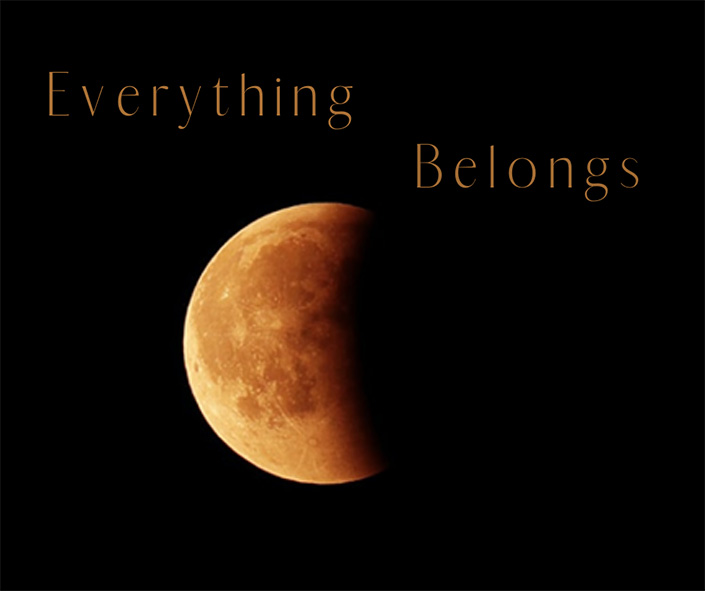Sacred Reflections


Everything Belongs
I grew up watching the children’s public television show, ‘Sesame Street’.
One song from that season of my life returns to me often.
“Which one of these things is not like the others?
Which one of these things, doesn’t belong?”
It accompanied a lesson on patterns. Four objects would be grouped together, and you had to find the one object different from all the others. It made a game of the important developmental task of making distinctions. Early in our life this important work helps us build our identity. We often learn who we, by first learning who we are not.
I am Catholic, not Protestant.
I am Public School, not private.
I am Math and Science, not Art and Writing.
I am Republican, not Democrat.
I am Urban, not Rural.
This way of seeing the world accompanies us for a long time, framing people and experiences as right/wrong, good/bad. It uses our external environment to help us know who we are.
Eventually though, as we develop and mature, we internalize this knowing. We live with ourselves long enough, to no longer need our parents, teachers, bosses, neighbors, pastor, etc. to tell us who we are.
And then an interesting thing happens.
We stop making distinctions.
Instead, we begin noticing what we share in common with people we once thought of as very different from us. We also become comfortable with paradox, realizing two opposite ideas can both be true. Instead of looking at the world and wondering “which one doesn’t belong”, we begin to realize “everything belongs”.
There is no shadow, without light.
We need dreamers/visionaries, and the ones who create budgets, structure and limits.
The engineer is also an artist.
No one is all good, or all bad.
This new way of seeing signals a spiritual transformation. We see this dynamic in the story of Jesus’ baptism and temptation, a story that holds paradoxes together like a sacred spiritual web.
Jesus’ baptism marks a spiritual mountaintop experience in Jesus’ life. The clouds part, the Spirt anoints, God calls out, “you are my beloved”.
Immediately the opposite happens. Jesus finds himself off the mountaintop and in the desert. Driven there by the same Spirit who just anointed him.
In the desert Jesus encounters Satan, wild beasts, and the Angels.
Jesus is both tested, and taken care of.
This 40 day experience transforms Jesus, revealing that the Kingdom of God has room for all the opposites, preparing Jesus to challenge the spiritual tradition that raised him:
- Sitting with tax collectors and prostitutes, Jesus affirms God’s sacred presence dwells among the unclean.
- Healing on the Sabbath, Jesus challenges a judgmental tradition with acts of compassion
- Telling stories in which heretics become teachers of faithfulness, Jesus enlarges the family of faith.
Over and over Jesus teaches the paradoxical lessons he learned in the wilderness:
- Love‘s embrace holds the shadow and the light
- Our ‘enemy’ can be our greatest teacher
- Love’s presence reveals itself in suffering and blessing
By bringing Peter, James and John up the mountain to witness his transfigured appearance, and then down the mountain to witness his crucifixion, Jesus invites them into the same spiritual path that transformed him, to witness God’s presence in paradoxical places. The Church’s season of Lent invites us to join their journey by taking on a spiritual practice that will disrupt our assumptions and transform our seeing. For some this means spending time among the poor, and unlearning beliefs about poverty. For others it means getting to know the critic living inside one’s head, learning to have compassion for the part of our story that created this voice. For another it could mean approaching the person whose politics opposes ours, and listening long enough to their story to find places of shared humanity.
For our St. Simon’s family, the daily meditations offered by our Innerground Railroad series offer this opportunity. Each week we will be invited to see how an indigenous wisdom tradition, like the Dagara Medicine Wheel from West Africa, can deepen our understanding of Jesus’ teachings.
No matter the spiritual practice, we will know it’s doing its transformative work, when our hearts embrace our enemy, our minds learn from people we’ve seen as “other”, our spirits discover the sacred in wilderness places we imagined God abandoned.
Then we will know that
“even though all of these things are not like another,
still everything belongs”
in God’s wide embrace.
Questions for Reflection
When have you learned from an unlikely source?
What spiritual practice has been most transformative for you?
What opposites have you learned can both be true?